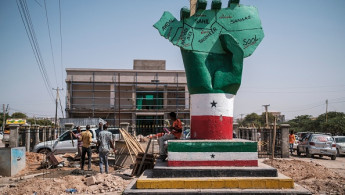Egypt warns citizens against travelling to Somaliland as tensions rise in Horn of Africa
Egypt's embassy in the Somali capital, Mogadishu, warned Egyptian nationals from travelling to Somaliland, "due to security concerns" as tensions between the unrecognised autonomous region and Somalia have escalated in recent weeks.
"The current security situation in Somaliland has limited the ability to provide any consular services," read an official statement released by the Egyptian embassy on Sunday, urging Egyptians already present in the self-declared republic to leave as soon as possible.
Ethiopia has recently provoked Somalia after it had reportedly sent a shipment of ammunition to the semi-autonomous Puntland region, a move condemned by Mogadishu as an "illegal act "and "a serious violation of its sovereignty."
Last week, during talks in Washington with the US Special Envoy for the Horn of Africa, Mike Hammer, and Assistant Secretary of State for African Affairs, Molly Phee, Egyptian Foreign Minister Badr Abdelatty stressed the significance of the Horn of Africa to the region's security.
The top Egyptian diplomat expressed his country's keenness towards Somalia's stability and its territorial security, and the need to fight terrorism.
Egypt and Somalia signed a defence agreement in August, amid ongoing disputes both countries have with Ethiopia. Egypt's recent involvement in the Somali crisis through military and security support has raised concerns over its attempt to assume influence in the Horn of Africa.
The ongoing dispute Egypt has with Ethiopia revolves around the Grand Ethiopian Renaissance Dam, which the latter constructed on the Blue Nile. Egypt fears Ethiopia's dam would deprive it of the life-giving water its people need to survive.
"The enemy of my enemy is my friend. The Egypt-Ethiopia talks on the dam ended in a deadlock. And Egypt needs to show a force projection," a prominent security analyst argued.
"At the end of the day, the Egyptian regime has been in an unenviable position with Ethiopia ignoring all direct and indirect threats after it has already begun the fifth filling of the dam's reservoir, threatening the livelihood of Egypt. It might be Egypt's only chance now to place itself in the region in case of restoring to war," the analyst told The New Arab on condition of anonymity for safety concerns.
Egypt delivered its first military aid to Somalia in almost four decades in the end of August, a move viewed by analysts as a form of provocation to Ethiopia preceded by a bilateral defence treaty signed about two weeks earlier.
Mogadishu and Cairo agreed to deploy Egyptian forces as part of an African peacekeeping force in Somalia scheduled to begin its mission later next year.
The current Somali-Ethiopian tension broke out in January this year after Ethiopia signed a memorandum of understanding with Somaliland to leas part of its coastline in return for Addis Ababa’s recognition of the region’s independence.
The deal, described by both parties as "historic," has been viewed by Mogadishu as a direct violation of its sovereignty and also denounced by Cairo.
Somaliland declared independence from Somalia in 1991, but this has not been recognised by the international community.





 Follow the Middle East's top stories in English at The New Arab on Google News
Follow the Middle East's top stories in English at The New Arab on Google News


